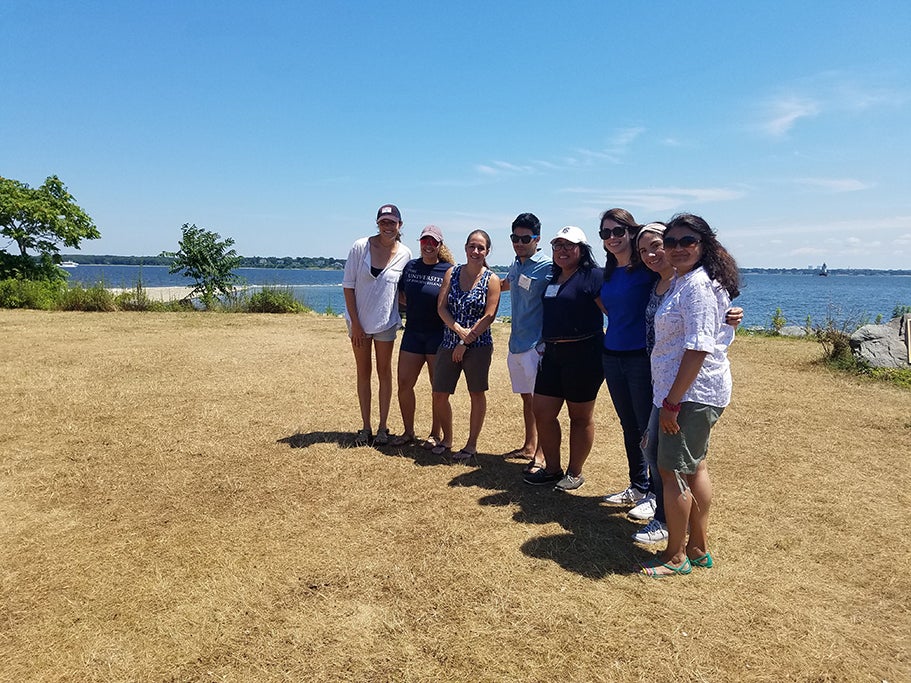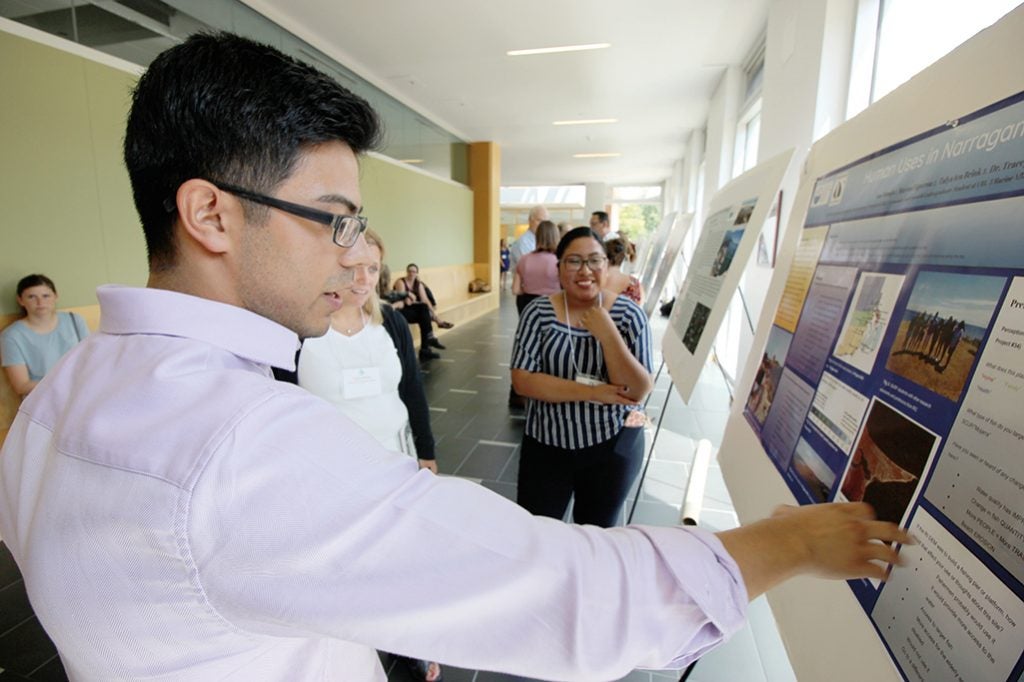
Some days, SURF students Ana Nimaja and Marcos Figueroa traveled along the rocky shoreline only to find bay users who wanted nothing to do with them. On a good day, however, coastal visitors opened up about their experiences along Rhode Island’s coast, detailing the bay’s significance beyond scientific research and tourist dollars.
“Catching people off-guard has been our specialty,” admitted Nimaja, a senior political science and Spanish major at the University of Rhode Island, this past July.
Nimaja and Figueroa teamed up with SURF mentors Dr. Tracey Dalton, professor of marine affairs at URI, and Talya ten Brink, as well as a group of social scientists from Rhode Island College, the University of Rhode Island and the Environmental Protection Agency, to conduct surveys of coastal users about how they interact with coastal areas in and around Narragansett Bay.
“The students worked on two different projects, an intercept survey on recreational use around the bay where we visit about 20 different sites,” explained ten Brink, a marine affairs doctoral student at URI. “The other interviewed recreational fisherman at four sites in Warwick.”

Reaching out to the Coastal Resources Management Council (CRMC) for input, ten Brink was asked to learn more about how millennials and minority groups utilize the bay’s coastal resources as the state organization gathers data for a new Narragansett Bay planning initiative.
“I have always been interested in the needs of people who have two jobs and don’t have time to speak at community meetings,” she emphasized. “I think it is really important to capture the voices of bay users who access the coast, a natural and healthy environment.”
Enter Nimaja and Figueroa. Both students speak Spanish fluently and are double majors in the language, a crucial qualification when surveying Hispanic coastal visitors. They did, however, face a big challenge in gathering substantive information through interviews, learning the skills of qualitative data collection.
“Sometimes people don’t want to talk. They’ll grunt at you and you say, ‘That’s discouraging’,” said Nimaja. “But then you have that one Cambodian man who has broken English but is willing to talk and speak about how the bay reminds him of his homeland. It is really great to hear all that.”
Ten Brink and the students have learned myriad reasons why Rhode Islanders visit the shore, from cancer patients looking for a moment of peace to older residents remembering past beach and fishing excursions.
“If you can figure out how far people are willing to travel to a place, you can understand how much the space is really worth to the overall community.” Marcos Figueroa, SURF undergraduate
“I am a huge history buff, and the nostalgia attached to Rocky Point is incredible when you talk to older folks,” noted Nimaja. “You don’t realize how important a place is to somebody until you sit down and talk to them.”
Figueroa, who majors in political science and economics, has discovered how much Rhode Islanders are investing in order to recreate around Narragansett Bay.
“If you can figure out how far people are willing to travel to a place, you can perhaps understand how much money they are spending in gas,” he said. “You can understand how much the space is really worth to the overall community.”
Since the summer, ten Brink has worked with the rest of the research team to analyze visitor survey data and interviews. Results from both studies will inform conclusions made by C-AIM researchers about Narragansett Bay as a social and economic resource for recreational uses.
“It will be a really long process, but hopefully we can connect with local communities and share these findings directly so that there is more awareness about the importance of coastal areas for minority groups, especially in urban areas like Providence,” said ten Brink.
For the SURFs, learning more about the social importance of Narragansett Bay has opened their eyes to new career pursuits.
“It is important for me to understand how the environment can affect sustainability and the overall economy, so it’s made me more curious to explore the field of resource economics more,” admitted Figueroa, who plans on applying to graduate school after URI.
Nimaja wants to take a gap year and perhaps teach English in Spain before pursuing a law degree. Although she was initially interested in criminal justice, environmental law is now an option to consider.
“When I first read our project descriptions, it sounded very scary because it was all really science-y,” said Nimaja. “I didn’t realize the environment mattered to so many, but having this experience has me really appreciating Narragansett Bay more. It has definitely impacted my perception of what I can do with my career.”

 RI NSF EPSCoR is supported in part by the U.S. National Science Foundation under EPSCoR Cooperative Agreements #OIA-2433276 and in part by the RI Commerce Corporation via the Science and Technology Advisory Committee [STAC]. Any opinions, findings, conclusions, or recommendations expressed in this material are those of the author(s) and do not necessarily reflect the views of the U.S. National Science Foundation, the RI Commerce Corporation, STAC, our partners or our collaborators.
RI NSF EPSCoR is supported in part by the U.S. National Science Foundation under EPSCoR Cooperative Agreements #OIA-2433276 and in part by the RI Commerce Corporation via the Science and Technology Advisory Committee [STAC]. Any opinions, findings, conclusions, or recommendations expressed in this material are those of the author(s) and do not necessarily reflect the views of the U.S. National Science Foundation, the RI Commerce Corporation, STAC, our partners or our collaborators.